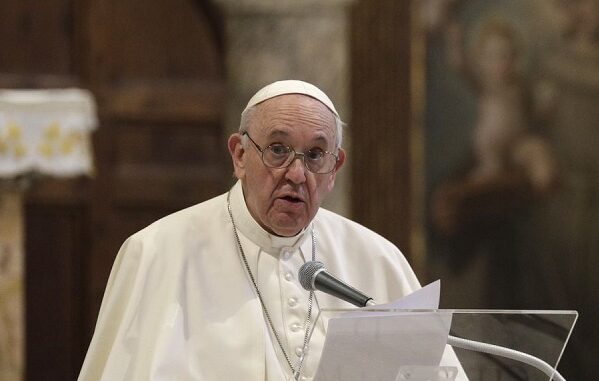
(RNS) — When Pope Francis first greeted the world from the balcony of St. Peter’s Basilica nine years ago, the outlines of the fissures that would proceed to rock the church and the world were only beginning to emerge. Still, it was clear from the start: Pope Francis would be a singular pope for these challenging times. His leadership is noteworthy not only because of its departure from papal precedent, but also because it incorporates key elements of the courageous, joyful, authentic and inclusive energy of Catholic sisters.
Indeed, at the time of Francis’ election, one of the most visible conflicts was between the Vatican and the Leadership Conference of Women Religious, the well-respected assembly that represents nearly 80% of women religious in the United States. The highly publicized three-year process came to a quiet end early in his papacy. Since then, Pope Francis has placed the witness of women religious like Sister Norma Pimentel, Sister Carol Keehan and Sister Jeannine Gramick back at the center of the church’s mission, while joining in their example of bringing both a contemplative spirit and active engagement to the very real conflicts and crises facing the world today.
Like Catholic sisters, Pope Francis has prioritized the well-being of others, especially those who are most marginalized by our social, political and economic systems. At the time of his election, we had witnessed growing economic inequality and record stratification of wealth for years, but we had not yet seen the destabilizing impact this would have on the world, with the rise of populist demagogues (including here in the U.S.) who exploit anger and scapegoat those already pushed to the margins of our society.
In the face of growing disparities, Pope Francis warns against allying oneself with authoritarian strongmen and encourages justice activists, whom he refers to as “social poets,” to create an alternative future to this brutalizing vision. One such endeavor is the Economy of Francesco, a worldwide project that invites young people and economists to envision a different kind of economy, one that “humanizes rather than dehumanizes, that takes care of creation and does not plunder it.”
When Francis was elected, we could not have imagined how central care for the environment would become in his teaching and his writing. The fallout of the climate crisis has only worsened in the last decade, with the most harmful effects undeniably falling on those least equipped to withstand them. Around the world, young people are vocally decrying the disaster we have left to them.
Pope Francis recognizes this and has couched his urgent moral pleas in the language of the integral connection we have to one another and to all of creation. Again, his actions and words mirror the unfailing relational lens Catholic sisters bring to all of their ministries, including the numerous ecology centers and initiatives founded or directed by Catholic sisters across the United States. Through this lens, care for the environment grows beyond simple stewardship and into an opportunity for all humanity to reembrace our sense of mutual belonging.
In the face of profound global upheaval, Pope Francis shares a clear-eyed prescription with women religious for much of the turmoil: hope. It’s not that we’re living through an era of change, he notes time and again. It’s that we’re living through a change of era — the end of one historical epoch and the start of another. So many people are gazing across a chasm of change and don’t see themselves represented on the other side — or they do see themselves, but with a loss of status, power or wealth. And as they react in fear of this, they wreak so much destruction. But Francis, like women religious, recognizes this shift in eras as an opportunity to build anew, to create what he calls a better kind of politics.
As we chart a future for our country and our world, Catholic sisters are calling for tremendous structural reform: dismantling systemic racism, rooting the economy in solidarity and cultivating truly inclusive communities. These women of deep faith and their allies advocate for just and equitable policies on immigration, housing, health care, economic security, voting rights and a sprawling patchwork of other issues that can transform the very fabric of our society.
After centuries of policymaking designed to benefit white men at the rest of our expense, this change will not come quickly or easily. Still, we are committed to pursuing this vision of gospel justice joyfully, and Pope Francis, calling in a clear voice from the Chair of Peter, is joined with us in this journey.
(Mary J. Novak is the executive director of Network, a national voice for Catholic social justice. Novak is a lawyer, educator, chaplain and spiritual director, restorative justice practitioner and activist who has worked in Catholic contexts for decades. The views expressed in this commentary do not necessarily reflect those of Religion News Service.)
END

Be the first to comment